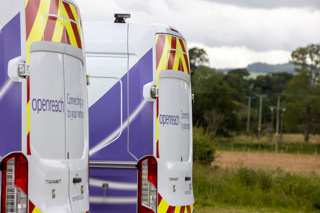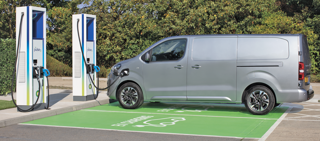Engine remapping has cut BT Group’s fuel costs by 10%, saving the company more than £4 million annually.
The environmental savings are greater still, equating to a 20% reduction in BT’s CO2 emissions.
The 25,000 tonnes of carbon dioxide saved is the equivalent of removing 1,900 taxis from the road.
“Engine remapping changes the way the burn happens in the engine,” explains Duncan Webb, commercial director at fleet management company BT Fleet, which manages BT’s 33,000 vehicles.
“It’s a cleaner burn so there are less carbon deposits.”
The idea to carry out engine remapping came from Webb’s engineering team.
“We saw that the technology was being used in the premium sports industry and when we explored it further it was clear that it could be used for economic purposes, not just performance improvements,” he says.
BT Fleet decided to partner with Viezu Technologies to assess whether remapping was viable.
The two companies began trialling the technology at Millbrook Proving Ground in mid-2012.
The trials, which included throttle, revs, speed and power limiting, showed fuel consumption could be reduced by about 11-16%, depending on vehicle type.
Following the five-week trial period, BT Fleet spent a month building the business case for remapping all of BT’s light commercial vehicles.
The project gained board approval and the first vehicles were remapped in August 2012.
All 24,000 vans were successfully remapped during 2013, making BT the largest fleet globally to implement such a programme.
BT Fleet also began offering engine remapping to its external customers last year.
“We’ve had major fleets that don’t currently do business with us approaching us about engine remapping,” says Dave Bowen, managing director of BT Fleet.
“Most companies want to do a pilot first to establish the potential savings and to help make the business case before rolling it out.”
Seven BT Fleet customers are in the pilot phase with their cars and vans, and two have already decided to roll it out to all of their vehicles.
Fleet News: Do you have any plans to remap BT’s company cars?
Duncan Webb: We are continuing to look at it. Part of the reason we haven’t done it yet is a lot of the cars are perk rather than job-need so the benefit will be to the individual and not the company.
We know we can do engine remapping with cars, we just haven’t chosen to yet. We have got some external customers that are introducing it to their company cars, though.
FN: What about BT’s LGVs?
DW: The technology works best with road-based fleet. Our trucks are used differently to our vans, they don’t go up and down motorways.
They are an engineering resource and have huge power take-off systems. We are concerned remapping may affect the power take-off system, so we haven’t adopted it with our LGV fleet yet.
FN: How did you tackle the logistics of remapping 24,000 vans?
DW: One of the advantages BT Fleet has is that we have a network of 64 garages, which we own.
We trained 110 transport technicians to carry out the work and a support team was set up at our headquarters. We were able to remap more than 360 vehicles a day.
The remapping was done when vehicles were already scheduled to be in the garage for an MOT or other service work or on a rostered day off.
The physical coding can be done in one hour. We also ran league tables with technicians competing to remap the most number of engines.
FN: Were there any issues you had to overcome?
DW: The biggest one was knowledge about engine remapping. Drivers were naturally sceptical about what we were doing to their vehicles.
We addressed that by explaining things upfront and providing each driver with information in the vehicle after it had been remapped. We explained that we were doing something that was good for the business and their own driving experience.
FN: What feedback did you have from the drivers?
DW: Two-thirds of drivers didn’t notice any difference in terms of how the vehicle felt to drive. Those that did notice a difference felt it was an improvement. Drivers like the performance, particularly lower down in the rev range.
FN: Were there any technical concerns about engine remapping?
DW: Any concerns were resolved with the evidence from the technical trials and the ISO-approved processes that underpin the service.
Each ECU remapping comes with an insurance-backed guarantee and retains all original settings on file. Should issues arise or vehicle requirements change, the ECU can be revised as required.
FN: What is the expected return on investment?
DW: Up to one year, but with BT Group’s van fleet it was nearer the six-month window.
Dave Bowen: Customers should start to see savings in month one. We are charging £250, which we believe is 30% cheaper than the retail market. Engine remapping in the retail market typically costs £350-£400.
FN: What would you say to fleet managers who are sceptical about engine remapping?
DB: Let us prove to you that it can work.
Next on the agenda for the BT Group fleet is a significant vehicle replacement programme.
“We used to change most of our product at the five-year mark,” says Webb. “But in late 2009 we started extending the life of our vehicles.
"We have found that we can manage vans at eight years but the wholelife cost balance does start to tip so we’ve got plans to bring our replacement cycle down to no more than seven years.”
BT Fleet has replaced more than 3,000 BT vans over the past 12 months and plans to double that number in 2014.
It intends to remap the new vehicles after a year of use to get a baseline for the results.
Vehicles that come off the fleet are not returned to their original settings.
“At de-fleet we leave the maps on the vehicles so that any future purchaser will also see the benefit,” says Webb.
“BT Fleet does extremely well with end-of-life sales, and on average achieves above CAP during dedicated auctions.
“We have seen no change in our CAP performance as a result of remapping.”
Factfile
Organisation: BT Fleet
Managing director: Dave Bowen
Commercial director: Duncan Webb
Fleet size (BT): 33,000
Fleet size (external customers): 43,000



















Login to comment
Comments
No comments have been made yet.